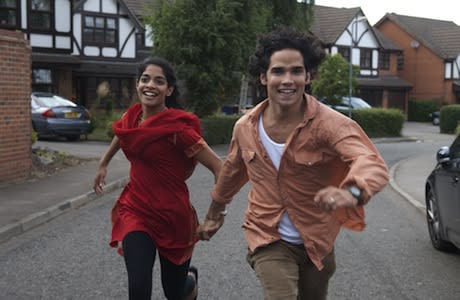In essence, deliberately idiosyncratic dysfunctional family dramedy All in Good Time is exactly what you would expect from the writer of East of East and the director of Calendar Girls and Saving Grace. It's a cutesy, broad feel-good comedy posing as something more than it is, offering glib, borderline insulting assertions about familial and marital woes without ever touching upon anything resembling a genuine human situation or emotion.
From the opening, where comely youngsters Atul (Reece Ritchie) and Vina (Amara Karan) are married, the respective families are drawn as broad archetypes. Atul's family — mostly his rambunctious, obese, alcoholic father (Harish Patel) — is uncouth and lacking in class (they host the wedding in a scout hall), whereas Vina's parents are uptight elitists with reserved emotions.
As such, the attempted comedy stems from drunken, inappropriate behaviour ("let's arm wrestle!") and bitchy, judgmental comments. We learn that Atul is routinely emasculated by his father and Vina is denied familial love, which helps outline the central point of conflict for the film, which is the couple's inability to consummate their union successfully.
Had All in Good Time stuck to its banal core, featuring jokes about the Kama Sutra ("We Indians invented it, you know?") and becoming sexually aroused while watching Bollywood dance sequences, then the limited scope and rigid ideological core wouldn't be quite as evident. The problem is that this comedy fancies itself a telling and insightful drama as well, dissecting the importance of sex in marriage without addressing the inherent silliness and self-defeating likelihood of waiting until the wedding night to get it on.
The film, much like its characters, focuses on exceedingly superficial, almost grotesque aspects of relationships, doting on erectile issues and sloppy cunnilingus rather than acknowledging the broader gamut of human connection. There's some babble about the nature of perception and the imposition of familial baggage, but it's boiled down mostly to the importance of making a man feel like a man.
It's this traditionalist perspective and overall lack of humour that make this insipid waste of time actively aggravating. It's time for Nigel Cole to look into directing sitcoms.
(Mongrel Media)From the opening, where comely youngsters Atul (Reece Ritchie) and Vina (Amara Karan) are married, the respective families are drawn as broad archetypes. Atul's family — mostly his rambunctious, obese, alcoholic father (Harish Patel) — is uncouth and lacking in class (they host the wedding in a scout hall), whereas Vina's parents are uptight elitists with reserved emotions.
As such, the attempted comedy stems from drunken, inappropriate behaviour ("let's arm wrestle!") and bitchy, judgmental comments. We learn that Atul is routinely emasculated by his father and Vina is denied familial love, which helps outline the central point of conflict for the film, which is the couple's inability to consummate their union successfully.
Had All in Good Time stuck to its banal core, featuring jokes about the Kama Sutra ("We Indians invented it, you know?") and becoming sexually aroused while watching Bollywood dance sequences, then the limited scope and rigid ideological core wouldn't be quite as evident. The problem is that this comedy fancies itself a telling and insightful drama as well, dissecting the importance of sex in marriage without addressing the inherent silliness and self-defeating likelihood of waiting until the wedding night to get it on.
The film, much like its characters, focuses on exceedingly superficial, almost grotesque aspects of relationships, doting on erectile issues and sloppy cunnilingus rather than acknowledging the broader gamut of human connection. There's some babble about the nature of perception and the imposition of familial baggage, but it's boiled down mostly to the importance of making a man feel like a man.
It's this traditionalist perspective and overall lack of humour that make this insipid waste of time actively aggravating. It's time for Nigel Cole to look into directing sitcoms.
